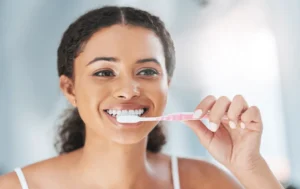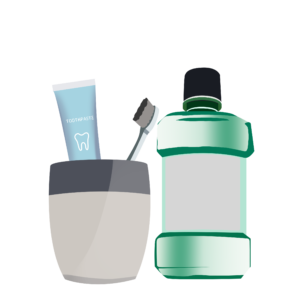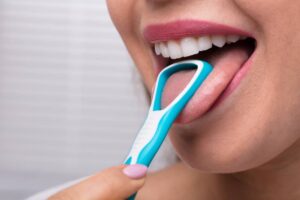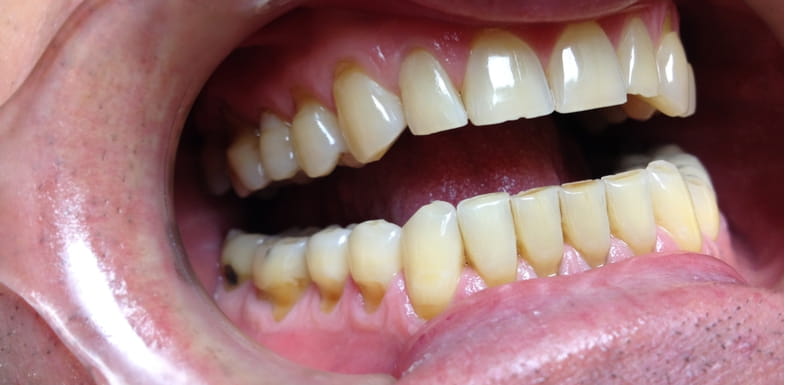Oral hygiene is more than just keeping the teeth clean—it’s essential for overall health. Good oral hygiene practices can prevent tooth decay, gum disease, and bad breath while contributing to overall well-being. This guide will provide everything needed to know to maintain excellent oral hygiene and achieve a healthy, bright smile.
The Fundamentals of Oral Hygiene:
1. Brushing
Brushing your teeth is the first and most important step in maintaining oral hygiene. It is recommended that you brush twice a day with fluoride toothpaste. It’s not just about the frequency but also the technique. Hold your toothbrush at a 45-degree angle to your gums and use gentle circular motions. This helps remove plaque without damaging your gums or enamel. Choosing the right toothbrush is also important as it helps to make the mouth properly cleaned. It is advisable to replace your toothbrush every three to four months or sooner if the bristles become frayed.

2. Flossing
Flossing is another important aspect of oral hygiene. It removes plaque and food particles between your teeth that your toothbrush can’t reach. To floss effectively, wind the floss around your fingers, and gently slide it between each tooth. Don’t forget to floss under the gumline.

3. Mouthwash
Mouthwash can be a valuable addition to your oral hygiene routine. It helps reduce plaque, freshen breath and prevent gum disease. There are various types of mouthwash, including antiseptic, fluoride, and natural options. Choose one that meets your specific needs.

4. Tongue Cleaning
Cleaning the tongue is often overlooked but equally important. Bacteria can accumulate on your tongue, leading to bad breath and other issues. It is advised to use a tongue scraper or your toothbrush to gently clean your tongue from back to front.

5. Hydration
Staying hydrated is another simple yet effective way to maintain oral health. Water helps wash away food particles and keeps your mouth moist, which is essential for saliva production. Saliva neutralizes acids and protects your teeth from decay.

The Role of Diet in Oral Hygiene
Your diet plays a significant role in your oral health. Foods rich in calcium and phosphorus, such as dairy products and leafy greens, help strengthen your teeth. Crunchy fruits and vegetables, like apples and carrots, stimulate saliva production and help clean your teeth naturally.
On the other hand, sugary snacks, acidic drinks, and sticky candies can harm your teeth. Sugar feeds the bacteria in your mouth, leading to plaque formation and tooth decay. Acidic beverages can destroy your enamel. If you consume these foods and drinks, try to do so in moderation and rinse your mouth with water afterward.
A balanced diet not only supports your overall health but also benefits your oral hygiene. Nutrients like vitamins C and D, found in fruits, vegetables, and fortified foods, promote healthy gums and teeth.
Common Oral Hygiene Mistakes to Avoid
• Brushing too hard is a common mistake that can damage your gums and enamel. Use a soft-bristled or medium-bristled toothbrush and gentle pressure to avoid harming your teeth.
• Neglecting your back teeth is another issue. These teeth are just as important as your front ones, and plaque can easily build up there. Make sure to brush all areas of your mouth, including along the gumline.
• Skipping routine dental visits can also jeopardize your oral health. Regular check-ups allow your dentist to clean your teeth professionally and detect any issues early on. Aim to visit your dentist every six months or as recommended.
The Benefits of Good Oral Hygiene
Maintaining good oral hygiene offers numerous benefits. It prevents tooth decay and gum disease, two common problems that can lead to tooth loss and other complications. Good oral hygiene also improves your overall health by reducing the risk of heart disease, diabetes, and respiratory infections.
Additionally, a clean, healthy mouth enhances your self-esteem. Achieving and maintaining excellent oral hygiene is a lifelong commitment that pays off in numerous ways. Start incorporating these oral hygiene practices into your daily routine today. Schedule your next dental appointment and take a proactive approach to your oral health. Share your own oral hygiene tips and experiences in the comments section below. Let’s build a community dedicated to healthy smiles!

